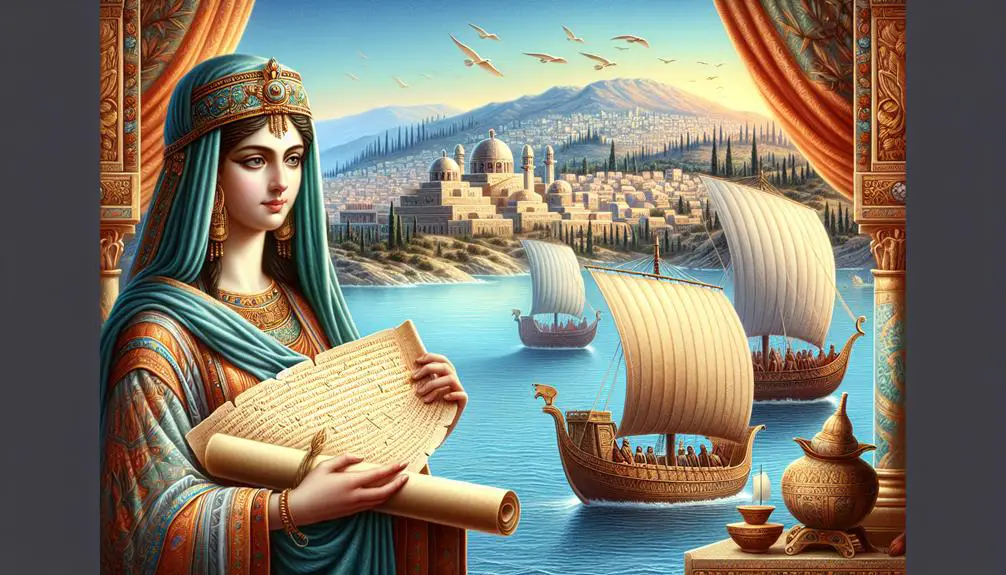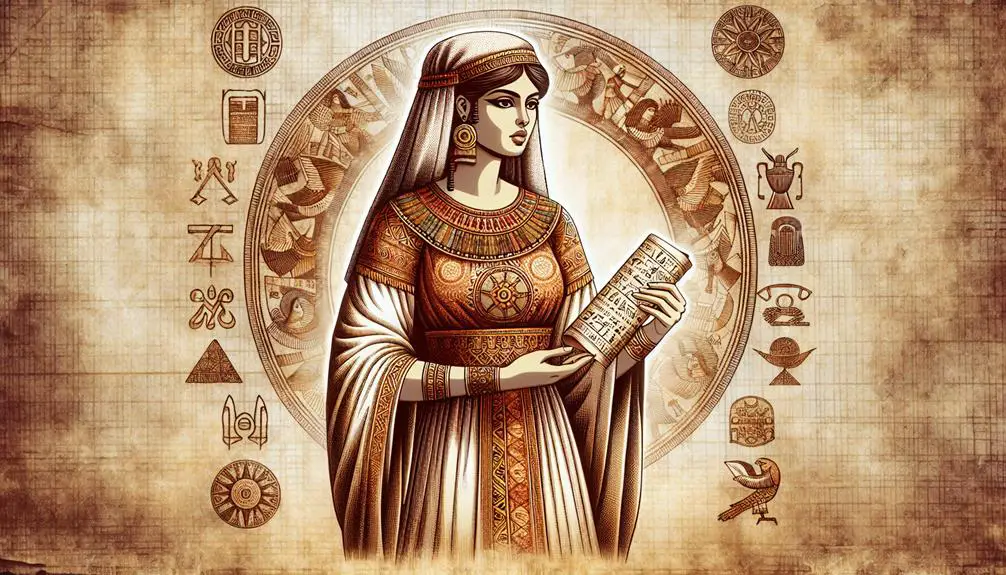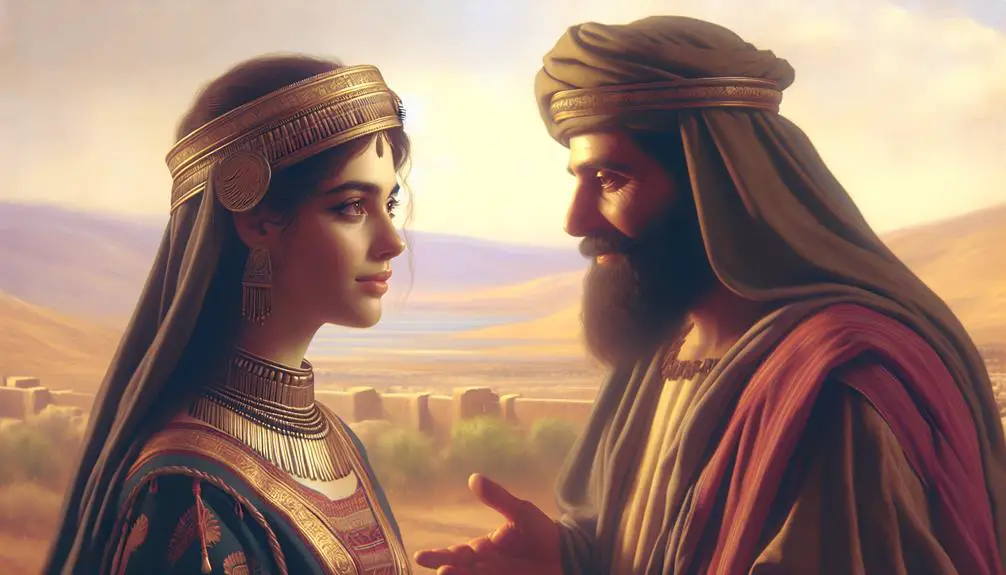Explore the fascinating story of the Phoenician woman's unwavering faith in the Bible, and how it challenges cultural boundaries and expectations.

Phoenician Woman in the Bible
In the rich tapestry of biblical narratives, the story of the Phoenician woman stands out for its profound exploration of faith, cultural boundaries, and divine compassion.
Found within the Gospels, this account not only offers insight into the historical and cultural context of the time but also challenges prevailing norms and expectations.
As we examine the dialogue between this determined woman and Jesus, questions of faith, persistence, and the universality of divine grace come to the foreground.
What makes this story particularly compelling is its ability to transcend time, inviting us to reflect on its relevance and implications in our modern world.
Key Takeaways
- Phoenician women in the Bible symbolize the cultural and religious intersections between Phoenicians and Israelites.
- Their portrayal challenges ancient Near East gender norms, showcasing dignity and resilience.
- Biblical narratives enrich understanding of Phoenician contributions to trade, culture, and global interactions.
- Modern interpretations reevaluate societal norms, highlighting the enduring relevance of Phoenician women's stories.
Historical Context

The Phoenicians, an ancient Semitic people known for their maritime trade and spread of the alphabet, play a pivotal role in understanding the socio-political landscape in which biblical narratives involving Phoenician women are set. This civilization, flourishing between 1500 BCE and 300 BCE, established a network of trade routes that connected various cultures and empires across the Mediterranean. Their expertise in navigation and commerce allowed them not only to disseminate goods but also to act as intermediaries in the exchange of cultural and political ideas.
Analyzing the historical context, it is clear that Phoenician cities like Tyre, Sidon, and Byblos were not isolated entities but pivotal hubs in ancient politics and economy. These city-states often engaged in complex diplomatic relations with powerful neighbors, including the Egyptians, Assyrians, Babylonians, and later, the Greeks and Romans. The strategic position of Phoenician cities along crucial maritime trade routes granted them significant influence and power, which they skillfully leveraged in ancient politics. This influence is crucial to understanding the backdrop against which stories of Phoenician women in the Bible are set.
Moreover, the Phoenicians' contribution to the spread of the alphabet underscores their role in the cultural and intellectual exchanges of the time. The alphabet not only facilitated trade by making record-keeping more efficient but also had profound implications for the development of literature and the transmission of religious texts.
Biblical Narrative

Transitioning from the historical context to the biblical narrative allows for a deeper understanding of the Phoenician woman's role within the scriptures.
This analysis will uncover her identity and examine the cultural impact of her story on both ancient and modern interpretations.
Woman's Identity Unveiled
In biblical narratives, the unveiling of a Phoenician woman's identity often signifies pivotal moments of cultural and theological intersection. This revelation, steeped in genealogical speculation, invites a deeper exploration of lineage and heritage, challenging prevailing notions of purity and belonging.
Literary symbolism further enriches this unveiling, as the Phoenician woman becomes a nexus of multi-layered meanings. Her identity, simultaneously concrete and allegorical, serves as a vehicle for examining themes of otherness, divine providence, and the permeability of cultural and religious boundaries.
Through this analytical lens, the portrayal of the Phoenician woman transcends mere historical recounting, offering instead a nuanced commentary on the complexities of identity, heritage, and divine interaction within the tapestry of biblical narrative.
Cultural Impact Explored
Several narratives within the biblical corpus underscore the profound cultural impact of Phoenician women, revealing their roles not merely as peripheral figures but as central agents of theological and societal transformation.
The interplay of gender dynamics within these texts highlights the intricate relations between Phoenician women and the Israelite community, challenging existing stereotypes and expectations.
Through their depiction, the Bible acknowledges the significant influence of these women, not only in the realm of ancient trade but also in the shaping of cultural and religious identities.
This acknowledgment serves as a testament to the complex interactions between different cultures in the ancient world, underlining the pivotal role that Phoenician women played in cross-cultural exchanges and the diffusion of knowledge, beliefs, and practices.
Cultural Significance

The cultural significance of Phoenician women in the biblical narrative extends beyond their historical presence, reflecting broader themes of interaction and influence between ancient civilizations. This impact is evident through an analysis of gender roles and artistic depictions, which provide insight into the societal norms and values of the time.
- Gender Roles: The portrayal of Phoenician women in biblical texts often challenges contemporary gender norms. Unlike the typically patriarchal societies of the ancient Near East, Phoenician women are depicted as possessing a degree of autonomy and influence, particularly in the realms of religion and trade. This depiction offers a nuanced understanding of gender roles within Phoenician society and suggests a level of social complexity that invites further scholarly examination.
- Artistic Depictions: In the realm of art, Phoenician women are frequently represented with a level of dignity and respect uncommon for the period. These depictions, found in a variety of mediums ranging from pottery to frescoes, serve not only as a testament to the artistic prowess of the Phoenicians but also as a window into the societal status afforded to women. The artistic record, thus, becomes a crucial source for understanding the cultural significance of these women within their own society and in interaction with neighboring cultures.
- Cross-Cultural Influence: The presence of Phoenician women in biblical narratives also highlights the cross-cultural exchanges between the Phoenicians and the Israelites. Through trade, marriage, and political alliances, Phoenician women played a role in facilitating the transmission of ideas, practices, and technologies between these two ancient civilizations, underscoring the interconnectedness of the ancient Mediterranean world.
Faith and Persistence

Exploring the theme of faith and persistence, Phoenician women in biblical narratives often embody resilience and devoutness, challenging and reshaping our understanding of their roles within both their societies and the broader biblical context. These narratives highlight not only their spiritual resilience but also their determined belief in the face of adversity. The Phoenician women's stories are emblematic of a broader thematic exploration of faith within the biblical text, presenting these characters as exemplars of unwavering commitment to their convictions.
Emotional Trigger |
Explanation |
|---|---|
Resilience |
The unwavering strength of Phoenician women, who persist in their faith despite societal and personal challenges, evokes admiration and empathy. |
Devoutness |
Their deep devotion and determined belief, often in dire circumstances, inspire a profound respect for their spiritual steadfastness. |
Analyzing these narratives, it becomes evident that the Phoenician women's persistence is not merely a personal trait but a profound expression of their spirituality. Their actions and decisions, driven by a deep-seated belief, underscore the potency of faith as a guiding principle in their lives. This determined belief, manifested through their actions, speaks volumes about their character and the broader implications of faith in the face of adversity. Their stories, therefore, do not just recount personal journeys of faith but also serve as a testament to the enduring power of spiritual resilience and determined belief. These narratives, rich with emotional depth and spiritual significance, invite readers to reflect on the transformative power of faith and the profound impact of persistence in achieving spiritual fulfillment.
Jesus' Response

In biblical narratives, Jesus' interactions with Phoenician women reveal a compassionate and inclusive approach, challenging contemporary societal and religious boundaries. This is vividly illustrated in the account of the Canaanite (or Phoenician) woman who approached Jesus, beseeching him to heal her demon-possessed daughter. Jesus' response to her, initially perceived as dismissive, unfolds into a profound lesson on faith, humility, and the breaking of cultural and religious barriers.
Analyzing Jesus' response involves understanding the complexity of:
- Miracle dynamics: Jesus' miracles were not just acts of healing but were also deeply symbolic, teaching moments for his followers and for those who would hear of them later. His interaction with the Phoenician woman extends beyond the immediate context, showcasing a universal approach to divine compassion and the power of faith across cultural divides.
- Cultural inclusivity: Jesus' eventual commendation of the woman's faith and his willingness to heal her daughter highlights his rejection of prevalent ethnocentric norms. This act signifies a critical moment of intercultural acknowledgment and respect, setting a precedent for his disciples and followers.
- Interfaith dialogue: Through this interaction, Jesus demonstrates the importance of faith over ethnic or religious background, encouraging a form of interfaith dialogue that was revolutionary at the time. This dialogue is not based on conversion but on mutual respect and recognition of faith, regardless of its origin.
Jesus' response to the Phoenician woman thus serves as a pivotal moment in the New Testament, illustrating his radical approach to inclusivity, faith, and the power of miracles, which transcends traditional boundaries and encourages a more compassionate and unified understanding of humanity.
Modern Interpretations

In the context of modern interpretations, the narrative of the Phoenician woman in the Bible transcends its ancient setting, offering insights into contemporary issues of cultural relevance and feminist perspectives.
Scholars and theologians increasingly explore how this account challenges traditional views on gender and cultural boundaries, prompting a reevaluation of societal norms.
This analysis not only enriches our understanding of biblical texts but also invites reflection on the enduring implications of these ancient stories in today's world.
Cultural Relevance Today
The cultural relevance of Phoenician women depicted in biblical narratives continues to resonate in modern interpretations, shedding light on contemporary discussions about gender, ethnicity, and religious identity. These ancient stories intersect with modern issues in several ways:
- Global Influences: The Phoenicians' widespread trade networks symbolize the early forms of global interaction, paralleling today's interconnected societies and the blending of cultures and beliefs.
- Contemporary Parallels: The challenges faced by Phoenician women, from societal roles to religious practices, mirror ongoing struggles for gender equality and religious freedom.
- Cultural Identity: Their stories contribute to a richer understanding of the ancient Near East's cultural mosaic, encouraging a reevaluation of historical narratives in the light of current discussions on diversity and multiculturalism.
This analysis offers a nuanced view of the past and its ongoing dialogue with the present.
Feminist Perspectives
Through a feminist lens, modern interpretations of Phoenician women in biblical narratives offer insightful reflections on gender dynamics and the reshaping of historical understanding. This approach scrutinizes the power structures that have traditionally narrated these women's roles and contributions, challenging long-standing perceptions and biases.
Feminist perspectives prioritize the agency of Phoenician women, highlighting their strategic navigation within patriarchal societies. This reevaluation not only contests the marginalization of these figures but also underscores the complexities of their identities and their interactions with surrounding cultures.
Frequently Asked Questions
How Did the Portrayal of Phoenician Women in Biblical Texts Compare to Their Portrayal in Contemporary Phoenician Literature?
The inquiry into the depiction of Phoenician women examines the contrast between biblical narratives and contemporary Phoenician literature.
This analysis highlights the representation of Phoenician women, often in the context of Phoenician goddesses and maritime trade.
The biblical portrayal tends to emphasize religious and moral contrasts, while Phoenician texts might reflect more on societal roles and reverence towards female deities, underscoring their integral role in both religious practices and economic activities related to maritime trade.
What Role Did Gender Play in the Interactions Between Phoenician Women and Men of Other Cultures, as Depicted Outside Biblical Narratives?
In ancient societies, gender roles significantly influenced interactions, especially in contexts of trade dynamics and cultural exchanges. Specifically, Phoenician women, when interacting with men from other cultures, often navigated complex social hierarchies that were not solely defined by their gender but also by their social and economic status.
These interactions highlight the multifaceted roles women played in facilitating trade and cultural exchanges between Phoenicia and its neighbors, underscoring their instrumental role in the ancient economy.
Are There Any Archaeological Findings That Specifically Relate to the Status or Daily Life of Phoenician Women During the Biblical Era?
Archaeological findings, such as grave goods and household artifacts, reveal insights into the societal roles and daily lives of women during the ancient era. These findings illustrate women's involvement in trade practices and religious rituals.
For instance, pottery and textile tools suggest their participation in economic activities, while ceremonial objects indicate their roles in religious practices. Such evidence provides a nuanced understanding of women's status and contributions to their societies in antiquity.
How Have Feminist Theologians Reinterpreted the Story of the Phoenician Woman in Light of Contemporary Gender Studies?
Feminist theologians, through the lens of contemporary gender studies, have reinterpreted the narrative, emphasizing gender empowerment and drawing modern parallels. This analytical approach unveils the dynamics of power and gender within the text, offering a fresh perspective that highlights the resilience and agency of women.
What Differences Exist in the Depiction of Phoenician Women Among Various Translations and Versions of the Bible, and How Have These Differences Influenced Theological Understanding?
Analyzing the depiction of women across various biblical translations reveals significant disparities, which carry profound theological implications. These differences stem from diverse translation methodologies, which in turn reflect evolving linguistic, cultural, and theological perspectives.
Consequently, scholarly examination of these variations not only illuminates the multifaceted portrayal of women but also invites a reevaluation of traditional theological understanding, thereby enriching contemporary religious discourse and scholarship on gender dynamics within biblical narratives.
Conclusion
In conclusion, the account of the Phoenician woman in the biblical narrative serves not only as a testament to the cultural and religious intersections of the ancient Near East but also as a profound exploration of faith, persistence, and divine response.
Through this story, one is compelled to ask: How does faith influence divine favor?
The narrative, rich in cultural significance and theological implications, continues to offer valuable insights for modern interpretations, demonstrating the enduring power of faith and the complexities of divine-human interactions.



Sign up